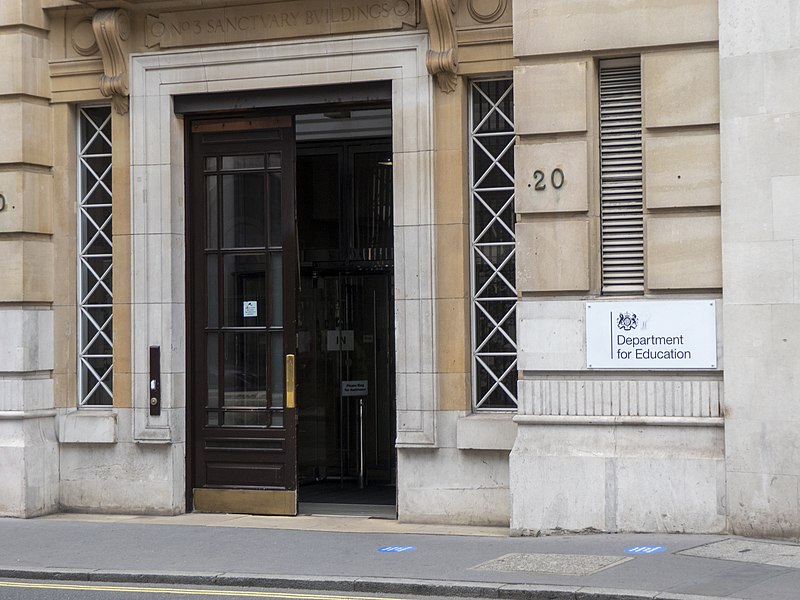Media
-
 Axel Springer backs Dovid Efune’s £500m Telegraph Bid, taking on Daily Mail owner DMGT
German media giant Axel Springer has thrown its weight behind a rival bid for Britain’s Telegraph Media Group, backing a £500 million offer led by U.S. publisher21 February 2026Read More...
Axel Springer backs Dovid Efune’s £500m Telegraph Bid, taking on Daily Mail owner DMGT
German media giant Axel Springer has thrown its weight behind a rival bid for Britain’s Telegraph Media Group, backing a £500 million offer led by U.S. publisher21 February 2026Read More... -
 UK leads global fight against deepfakes with science-driven detection standards
Deepfakes—AI-generated videos, images and audio—are no longer a fringe curiosity. They are a fast-growing threat across the UK, exploited by criminals to scam victims out of money,19 February 2026Read More...
UK leads global fight against deepfakes with science-driven detection standards
Deepfakes—AI-generated videos, images and audio—are no longer a fringe curiosity. They are a fast-growing threat across the UK, exploited by criminals to scam victims out of money,19 February 2026Read More... -
 Former Daily Mail editor Paul Dacre tells UK court he is “angry and upset” over Prince Harry privacy claims
Paul Dacre, the long-serving former editor of the Daily Mail and one of the most influential figures in British journalism, told the High Court in London that he felt11 February 2026Read More...
Former Daily Mail editor Paul Dacre tells UK court he is “angry and upset” over Prince Harry privacy claims
Paul Dacre, the long-serving former editor of the Daily Mail and one of the most influential figures in British journalism, told the High Court in London that he felt11 February 2026Read More... -
 BBC TV licence fee to rise to £180 from April, sparking anger as costs overtake streaming rivals
The annual TV licence fee will rise by £5.50 to £180 from April 1, dealing another blow to household budgets already stretched by the cost-of-living crisis.06 February 2026Read More...
BBC TV licence fee to rise to £180 from April, sparking anger as costs overtake streaming rivals
The annual TV licence fee will rise by £5.50 to £180 from April 1, dealing another blow to household budgets already stretched by the cost-of-living crisis.06 February 2026Read More... -
 Elton John’s husband David Furnish accuses Daily Mail of homophobia and privacy violations in High Court trial
David Furnish, the husband of British music icon Elton John, has accused the publisher of the Daily Mail of unlawfully obtaining private information about their06 February 2026Read More...
Elton John’s husband David Furnish accuses Daily Mail of homophobia and privacy violations in High Court trial
David Furnish, the husband of British music icon Elton John, has accused the publisher of the Daily Mail of unlawfully obtaining private information about their06 February 2026Read More...

Culture
-
 UK music exports get £1.4m boost as 68 independent artists win global growth grants
Rising British music talent is set for a global push after 68 independent UK acts secured a combined £1.4 million in government-backed funding designed to grow international audiences, boostRead More...
UK music exports get £1.4m boost as 68 independent artists win global growth grants
Rising British music talent is set for a global push after 68 independent UK acts secured a combined £1.4 million in government-backed funding designed to grow international audiences, boostRead More... -
 Emery Walker revealed: new exhibition explores the man behind the arts and crafts legend
A new exhibition opening this spring at Emery Walker’s House sets out to restore depth, warmth, and personality to one of Britain’s most influential yetRead More...
Emery Walker revealed: new exhibition explores the man behind the arts and crafts legend
A new exhibition opening this spring at Emery Walker’s House sets out to restore depth, warmth, and personality to one of Britain’s most influential yetRead More... -
 London confirms St Patrick’s Day 2026 parade and Trafalgar Square festival
London will turn green once again next spring after the Mayor confirmed the capital’s St Patrick’s Day celebrations will take place on Sunday 15 March 2026, with aRead More...
London confirms St Patrick’s Day 2026 parade and Trafalgar Square festival
London will turn green once again next spring after the Mayor confirmed the capital’s St Patrick’s Day celebrations will take place on Sunday 15 March 2026, with aRead More... -
 Masterpieces beyond the Museum: National Gallery brings life-size art to communities ccross the UK
World-famous paintings from the National Gallery are stepping out of Trafalgar Square and into everyday life, as part of a major touring project that will seeRead More...
Masterpieces beyond the Museum: National Gallery brings life-size art to communities ccross the UK
World-famous paintings from the National Gallery are stepping out of Trafalgar Square and into everyday life, as part of a major touring project that will seeRead More... -
 Award-winning Polish writer Mariusz Szczygieł brings ‘Not There’ essay collection on UK tour
Polish writer Mariusz Szczygieł, one of Central Europe’s most acclaimed literary reporters, will tour the UK later this month with a series of public events marking the English-language release...Read More...
Award-winning Polish writer Mariusz Szczygieł brings ‘Not There’ essay collection on UK tour
Polish writer Mariusz Szczygieł, one of Central Europe’s most acclaimed literary reporters, will tour the UK later this month with a series of public events marking the English-language release...Read More... -
 Professor Dame Carol Black GBE reappointed as Chair of the British Library for 2026–2027
The UK Secretary of State has confirmed the extension of Professor Dame Carol Black GBE as Chair of the British Library, continuing her leadership from 1 September 2026 to 31 August 2027.Read More...
Professor Dame Carol Black GBE reappointed as Chair of the British Library for 2026–2027
The UK Secretary of State has confirmed the extension of Professor Dame Carol Black GBE as Chair of the British Library, continuing her leadership from 1 September 2026 to 31 August 2027.Read More... -
 Climate, community and care: Soma Surovi Jannat’s landmark exhibition at the Ashmolean Museum
From spring through autumn 2026, the Ashmolean Museum presents 'Soma Surovi Jannat: Climate Culture Care', a powerful new exhibition that places climateRead More...
Climate, community and care: Soma Surovi Jannat’s landmark exhibition at the Ashmolean Museum
From spring through autumn 2026, the Ashmolean Museum presents 'Soma Surovi Jannat: Climate Culture Care', a powerful new exhibition that places climateRead More... -
 Londoners on trial: 700 years of crime revealed in a free City archives exhibition
From medieval pickpockets to notorious Victorian figures, seven centuries of crime, punishment and public fascination are laid bare in a new exhibition atRead More...
Londoners on trial: 700 years of crime revealed in a free City archives exhibition
From medieval pickpockets to notorious Victorian figures, seven centuries of crime, punishment and public fascination are laid bare in a new exhibition atRead More... -
 Lost for centuries, Henry VIII’s golden love pendant finds a home at the British Museum
A golden heart pendant once symbolizing the doomed marriage of Henry VIII and Katherine of Aragon has finally been secured for permanent display at the BritishRead More...
Lost for centuries, Henry VIII’s golden love pendant finds a home at the British Museum
A golden heart pendant once symbolizing the doomed marriage of Henry VIII and Katherine of Aragon has finally been secured for permanent display at the BritishRead More... -
 British High Commission hosts Caledonian Ball in Lahore to celebrate growing Scotland–Pakistan partnership
The British High Commission brought a touch of Scotland to Lahore this week as it hosted the Caledonian Ball at the historic Sir Ganga Ram Residence, celebratingRead More...
British High Commission hosts Caledonian Ball in Lahore to celebrate growing Scotland–Pakistan partnership
The British High Commission brought a touch of Scotland to Lahore this week as it hosted the Caledonian Ball at the historic Sir Ganga Ram Residence, celebratingRead More... -
 300-year-old Rysbrack Marble putti blocked from export as UK scrambles to save national treasure
A three-century-old marble sculpture by renowned eighteenth-century sculptor Michael Rysbrack has been placed under a temporary UK export ban, giving BritishRead More...
300-year-old Rysbrack Marble putti blocked from export as UK scrambles to save national treasure
A three-century-old marble sculpture by renowned eighteenth-century sculptor Michael Rysbrack has been placed under a temporary UK export ban, giving BritishRead More... -
 Inside ICG PR: how an international PR agency shapes reputation for luxury, fashion, and cultural brands
Interview: the co-founder of Iris Consulting Group Iryna Kotlyarevska on building global visibility with cultural intelligenceRead More...
Inside ICG PR: how an international PR agency shapes reputation for luxury, fashion, and cultural brands
Interview: the co-founder of Iris Consulting Group Iryna Kotlyarevska on building global visibility with cultural intelligenceRead More...

British Queen celebrates
Most Read
- Teen held after US woman killed in London stabbings
- Heave-ho Harry! Prince prepares to join the walking wounded in ice trek to North Pole
- Football: Farhad Moshiri adamant Everton deal above board
- "Master of English Style". Interview with Designer Lydia Dart
- Letter to the Financial Times from Lord Mayor Alderman Michael Bear
Education

England came fourth out of the 43 countries that tested children of the same age in the Progress International Reading Literacy Study (PIRLS).

On 10 May 2023 Lord (Tariq) Ahmad of Wimbledon, Minister of State for the Middle East and North Africa, South Asia, the UN, and the Prime Minister’s Special

On May 11th, 2023, the University of Oxford was awarded University of Sanctuary status for its commitment to aiding those forcibly displaced around the world.

UK science and research facilities will receive a share of £103 million in government funding, aimed at upgrading the UK’s already world class research infrastructure

More students across England will benefit from a £5,000 bursary to pursue careers as planners designing greener neighbourhoods and thriving towns, the Housing

A new UK funded programme will offer some of the most marginalised women and girls in Southeast Asia a better future by boosting access to a quality education.

Six green apprenticeships have been hand-picked by industry experts to mark the Coronation in recognition of their sustainability credentials, the Department for Education has announced

According to data from the Department for Education (DfE), more than half of state schools in England restricted access to pupils or were fully closed during teacher strikes by the National

Cambridge University students celebrated "Caesarian Sunday" with a fancy-dress drinking event on the college green, as thousands gathered to participate in the

The Duke of Bavaria, Franz Bonaventura Adalbert Maria, is first in line to the Jacobite succession for the British crown. He is a descendant of King Charles I's daughter




















